Howard Andrew Jones's Blog, page 24
March 6, 2017
Of Gates and Sherlock
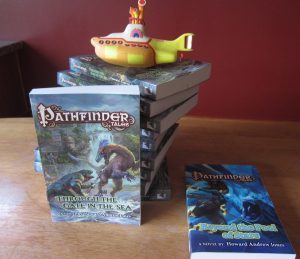 Here’s a sample chapter for my new Pathfinder book, Through the Gate in the Sea. You want underwater adventure with a daring salvager and her lizard man friend, you’ve come to the right place. I’ve been writing some promo spots for the book in the last few days, the first of which will be going up at Paizo soon. I’ll post a link when it’s ready.
Here’s a sample chapter for my new Pathfinder book, Through the Gate in the Sea. You want underwater adventure with a daring salvager and her lizard man friend, you’ve come to the right place. I’ve been writing some promo spots for the book in the last few days, the first of which will be going up at Paizo soon. I’ll post a link when it’s ready.
In other news, I finally tried out the Sherlock Holmes Consulting Detective game. If you’re not in the know, it has a venerable history. Decades old, it was a co-op game long before those were in vogue, sort of a cross between a choose-your-own adventure book and a, well, I don’t know what else, because it’s pretty unique. At this point it’s gone through a number of editions, complete with hard-to-find expansions and one-offs that drive completists like me crazy (although not as crazy as my pal John O’Neill, because he sometimes finds games in shrink wrap and then won’t dare open them… so has to buy another, the madman).
 The French seemed to have loved this Sherlock Holmes game more than anyone else. You’d think it would be the English, but it really took off in France, where the current publishers are based. They’ve been steadily producing expansions that the non-French speaking public hasn’t been able to read. Now, though, many of those expansions are slated for release in English. An odd problem was created when some of the cases were re-translated back from French to English — two cases were a little broken as a result — but that’s supposed to have been cleared up now, and the new version of the original game that featured those cases is supposed to be available later this year. Prior to that, some point mid year, will be ANOTHER expansion. (Well, I SAY expansion, but it’s actually a complete game in itself using the same system, just as the one I picked up.) That’s a total of three boxed games, or thirty cases, some of which are interconnected.
The French seemed to have loved this Sherlock Holmes game more than anyone else. You’d think it would be the English, but it really took off in France, where the current publishers are based. They’ve been steadily producing expansions that the non-French speaking public hasn’t been able to read. Now, though, many of those expansions are slated for release in English. An odd problem was created when some of the cases were re-translated back from French to English — two cases were a little broken as a result — but that’s supposed to have been cleared up now, and the new version of the original game that featured those cases is supposed to be available later this year. Prior to that, some point mid year, will be ANOTHER expansion. (Well, I SAY expansion, but it’s actually a complete game in itself using the same system, just as the one I picked up.) That’s a total of three boxed games, or thirty cases, some of which are interconnected.
Working in their free time, fans of the game have created some outstanding expansions on their own, and some translators have donated their free time to make some of those European cases available in English. If you visit the Files section of the Sherlock Holmes Consulting Detective page on Board Game Geek you can find many of these. So long as you have a game board and the directory from one of the boxed sets (like the one I bough last month) you’ll be able to play most of these cases. (Others cases individual pages — again, you have to check their file sections.)
Right now the only in print edition, released last month, is Sherlock Holmes: Consulting Detective — Jack the Ripper and West End Adventures. It comes with six standalone cases and four interconnected cases and while its an “expansion” you don’t need any other pieces to play.
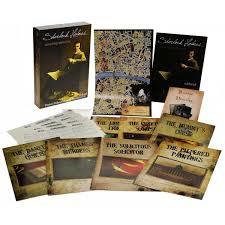
Main game, with casebooks in front. Folded map is in back.
Judging by how much fun was had by my wife and son and me last night, I think we’ll be playing for a while to come. I didn’t run it exactly as intended. I decided to present the thing as a game master and them as players, complete to creating personalities for their sleuths. Rather than reading out the encounter from the paragraph book once they’d arrived at a location, I’d have them role-play what they were doing and I’d role-play the people encountered. I even occasionally had them roll dice for things.
The game comes with a wonderful map of Victorian London and a London directory of locations and addresses and businesses that must be visited to investigate the mysteries, and casebooks devoted to the different mysteries that include the clues and red herrings and secret codes that must be cracked — there are all kinds of great puzzles. There are also lovingly created facsimile newspapers in the style of The Times from Holmes’ era, and info in those newspapers can be used in any case. For instance, a later case might require some data that’s found in one of the earlier papers. So you have to be paying attention and do a lot of thinking!
Rather than starting with the cases in the box, I opted to begin with a shorter, fan created case by Yann Gentil, titled “The Hanged Man,” translated for the sheer love of the game by a gentleman named Dave C. I pulled it down from BoardGame Geek, studied up on it until I knew the motivations and the clues and all that, then created a framing story that served as an origin for the characters and how they met Sherlock Holmes, and ran it.
Boy, were the players transported. They had just an immense amount of fun, and you know what, so did I. We’re really looking forward to playing again. They LOVED using the map, and the directory, and the newspapers, and struggling to solve the code, and tracking down the puzzles… it was a blast.
March 3, 2017
Secret Projects and the Wish for Style
 Monday I briefly touched upon some secret projects and sparked some speculation. Rather than answering thedarkman’s question on that older post, I thought I’d open by touching upon it today. Yes, one of those secret projects is rich with old school sword-and-sorcery. So much so that your socks are going to be blown off when you get it in your hands. I am grinning with delight every time I think about the quality of the work involved, and the art I’ve seen, and other components, and when the time comes I’ll shout about project x from the rooftops and hope that you’ll help me spread the word about it so it can reach as wide an audience as possible. With a little luck and hard work more and similar things will come to fruition.
Monday I briefly touched upon some secret projects and sparked some speculation. Rather than answering thedarkman’s question on that older post, I thought I’d open by touching upon it today. Yes, one of those secret projects is rich with old school sword-and-sorcery. So much so that your socks are going to be blown off when you get it in your hands. I am grinning with delight every time I think about the quality of the work involved, and the art I’ve seen, and other components, and when the time comes I’ll shout about project x from the rooftops and hope that you’ll help me spread the word about it so it can reach as wide an audience as possible. With a little luck and hard work more and similar things will come to fruition.
Yes, I wish I could say more. Soon I shall. No, it’s not a secret novel. And yes, the new novel project is definitely sword-and-sorcery as well, although it’s got more of a Zelaznian than a Howardian spin… and I’d like to say it’s got a Howard Jonesian spin to it as well. It would be nice to think that I’ve got my own style at this point, although maybe that’s not always apparent.
I mean, in the Dabir and Asim stories I deliberately use a formality to give it a faux “ancient manuscript” vibe, and relate everything through an unreliable narrator, and THAT’s not my style, just one that I use for those stories. And the Pathfinder books are a little pulpier — though in a good way, I hope — than what I might normally draft.
So maybe THIS series is more like a straight presentation of my prose stylings. I think you can see all of my favorite writerly influences, and my love of strong pacing and interesting characters. Perhaps the most common thread in my fiction is that I believe in heroes who will stand up and do the right thing even when no one is watching. As a student of history, I know that they have existed and come through for us in the past, and I know that heroes still live today among us. And I’m frankly a little tired of reading about the unhreoic ALL the time.
That’s not to say I like flawless, unrealistic do-gooders. Or that I never want to read about anti-heroes or rogues. Any frequent visitor to this blog knows how influential a lot of the Lankhmar stories were on this storyteller, and the tales of Leigh Brackett, and maybe they know just how much I love the movie Butch Cassidy and the Sundance Kid. There are scads of rogues in that there fiction, folks. But I like to write stories about heroes and I don’t see any sign of that stopping.
March 1, 2017
Of Gates and Parachutes
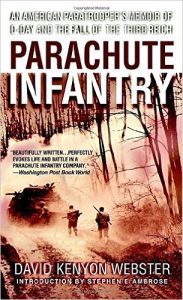 Today’s the day my new Pathfinder book, Through the Gate in the Sea, gets released! Kind of a strange feeling. I wrote it in 2015 and made a final pass through it last summer, so it’s been off my radar for a long while. Now I’ll have to see if I recall how to add books to my book slider on my home page!
Today’s the day my new Pathfinder book, Through the Gate in the Sea, gets released! Kind of a strange feeling. I wrote it in 2015 and made a final pass through it last summer, so it’s been off my radar for a long while. Now I’ll have to see if I recall how to add books to my book slider on my home page!
I’ve been doing a lot of WWII reading in the last few weeks, as I think I’ve mentioned. One of the true standouts is Parachute Infantry, by David Kenyon Webster. If you watched Band of Brothers, he’s the central character of one of the later episodes. He wrote his memoirs of his time in Easy company after the war but never found a publisher.
Long after Webster’s death Stephen Ambrose read the book and championed its publication. It has a wonderfully engaging, descriptive tone. An immediacy stemming both from emotional honesty and crystal clear prose. That guy could WRITE. The people from the company that he interacts with live again through his words. Don’t believe me? Check out the glowing reviews of the book, because they’re not hyperbole. Highly, highly recommended.
It’s a crime that no one wanted to publish the book in his lifetime.
February 27, 2017
Quick Update, Now with Conan
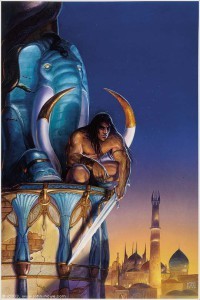 I’ll keep this brief. In my limited spare time I’ve been working on a couple of projects that I can hardly wait to reveal… but must. One of them is going to be of great interest to sword-and-sorcery fans, and the other is research for a genre I’ve never written in.
I’ll keep this brief. In my limited spare time I’ve been working on a couple of projects that I can hardly wait to reveal… but must. One of them is going to be of great interest to sword-and-sorcery fans, and the other is research for a genre I’ve never written in.
Most time, though, has gone to the creeping progress towards the conclusion of the revision of book 1 of my big new series. And darned if I can’t really talk too much about that, either. I just hope all of this hard work is going to pay off.
It’s probably no fun to read such a mysterious entry, so let me point you towards something fairly cool. Hocking noticed this a couple of weeks ago and I’ve been meaning to share it. Here’s an essay about Conan and Robert E. Howard that manages to see things from a new and insightful perspective. I especially like the part where the writer calls out the perception of “failings” in the execution of “The Tower of the Elephant.”
Right — back to the salt mines.
February 20, 2017
Link Day
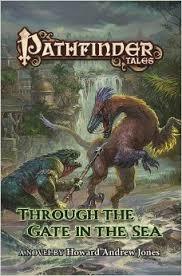 Last Friday Black Gate posted a mini-interview with me about my upcoming Pathfinder novel. While John was asking me questions it reminded me just how much I love the characters in these two most recent books.
Last Friday Black Gate posted a mini-interview with me about my upcoming Pathfinder novel. While John was asking me questions it reminded me just how much I love the characters in these two most recent books.
…and there’s not a great deal else to report. I’m still putting finishing touches on a major rewrite on my longest novel yet. I’m working on a couple of secret projects on the sidelines. While those projects are back burnered, I’m researching them a bit with some World War II research that has included re-watching Band of Brothers, reading the book (I’d previously read Major Dick Winter’s memoir, Beyond Band of Brothers, and reading some of Sven Hassel’s novels about the German side of the war. And here’s a thankful hat tip to Chuck Dixon for recommending those books to me, because they’ve been highly enjoyable, and another hat tip to Chris Hocking for pointing me towards Dixon to ask, because he’d sure he’d heard about a series some years back but couldn’t recall the author’s name.
February 10, 2017
Bear Power
 My wife had “Mysteries of the Museum” on in the background last night. Usually I’m typing away or researching or reading while she runs the television in the evening, but I perked up during the story of Voytek the soldier bear. The details were so preposterous I had to stop what I was doing and look him up. I discovered that not only was the account true, there were even more stories about how awesome Voytek was. The bear so distinguished himself in the line of duty that his Polish unit actually changed their emblem to the image you see on the left.
My wife had “Mysteries of the Museum” on in the background last night. Usually I’m typing away or researching or reading while she runs the television in the evening, but I perked up during the story of Voytek the soldier bear. The details were so preposterous I had to stop what I was doing and look him up. I discovered that not only was the account true, there were even more stories about how awesome Voytek was. The bear so distinguished himself in the line of duty that his Polish unit actually changed their emblem to the image you see on the left.
I read several accounts of his life and adventures, and this was the most entertaining even if it employs ungentlemanly language. I think that’s the secret of some of its humor, but I’ve been kind of down on ungentlemanly conduct lately, so I thought I’d warn you. Here’s another article with a few additional details.
There’s apparently a documentary about Votyek as well. I swear, if I put this stuff in a story people would laugh at me for the sheer absurdity… But since it’s true, it’s pretty danged cool.
February 8, 2017
Through the Gate in the Sea
 Author copies of my new book arrived the other day! Woo-hoo! There she be, the sequel to Beyond the Pool of Stars, right beside the Yellow Submarine.
Author copies of my new book arrived the other day! Woo-hoo! There she be, the sequel to Beyond the Pool of Stars, right beside the Yellow Submarine.
It’s a good feeling. Now, time to get back to revising the final chapters of the first book of my new series… So very, very close…
February 6, 2017
Thinking of Poul
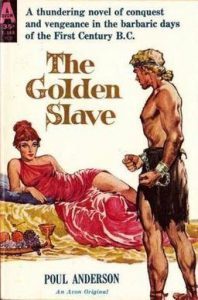 I was exchanging notes with Scott Lynch about a grand short story he’s got coming out soon, and he happened to mention how much he’s been enjoying some Poul Anderson. And that got me thinking just how much I sometimes like Anderson’s work. I’ve never listed him as a favorite author, but he’s written a number of books on my “keeper” list. There’s The Broken Sword, or course, a great take on some of the same mythic material that inspired Tolkien. Ryan Harvey did a great job discussing the text back in 2007 at Black Gate.
I was exchanging notes with Scott Lynch about a grand short story he’s got coming out soon, and he happened to mention how much he’s been enjoying some Poul Anderson. And that got me thinking just how much I sometimes like Anderson’s work. I’ve never listed him as a favorite author, but he’s written a number of books on my “keeper” list. There’s The Broken Sword, or course, a great take on some of the same mythic material that inspired Tolkien. Ryan Harvey did a great job discussing the text back in 2007 at Black Gate.
More recently Gabe Dybing covered another of my favorite Anderson novels, The Golden Slave at Black Gate (along with The High Crusade, one I haven’t read).
It wasn’t too long ago that works like these were hidden secrets. Sure, they’re not widely known anymore, but it seems like word is out about the good ones. And I’m pretty sure that they’re still fairly cheap to lay hands on if you go through a used book search site like Addall. It would be pretty swell if someone would collect Anderson’s best historicals in an omnibus. Not me, though. I have enough on my plate as it is…
February 3, 2017
Writing Musings
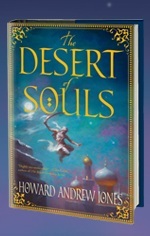 It seems as though all of my time is consumed with painstaking revisions of the work in progress. I’m usually not this late, but, well, I’d thought to have it turned over to my publisher by the end of November and here it is the first week of February. Page by page it’s getting there, and this problematic secondary arc is getting more and more flesh on it.
It seems as though all of my time is consumed with painstaking revisions of the work in progress. I’m usually not this late, but, well, I’d thought to have it turned over to my publisher by the end of November and here it is the first week of February. Page by page it’s getting there, and this problematic secondary arc is getting more and more flesh on it.
I’ve been trying to figure out what I can learn from this slow-down so I don’t make the same mistake next time, and I’m scratching my head a little. I’ve written before about my new outlining process, which was certainly a success, because it allowed me to get the initial draft down. None of the major beats have changed, which means the process worked. Where I failed myself was in properly fleshing things out moving forward from the outline phase, and I’ve had to go back again and again to get everyone sounding right, to string the events together more tightly, and to punch up the action scenes.
I’ve been saying I was close to turning it over for months now, but I think this time I may finally be only a week or so out. Then I hope to finishing sorting a bunch of junk in the basement — which won’t be much fun — and playing some of those great solitaire boardgames in the evenings, which will be.
February 1, 2017
Chandler Collected
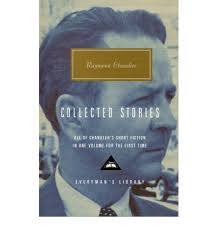 I became a Raymond Chandler fan only a few years ago because I’d seldom wandered beyond the genre walls I threw up for myself — historical fiction, history, fantasy, the occasional space opera or hard science fiction novel. As I’ve mentioned previously on this blog, I fell for Chandler’s prose, so it was only natural that I explore his canon.
I became a Raymond Chandler fan only a few years ago because I’d seldom wandered beyond the genre walls I threw up for myself — historical fiction, history, fantasy, the occasional space opera or hard science fiction novel. As I’ve mentioned previously on this blog, I fell for Chandler’s prose, so it was only natural that I explore his canon.
On my birthday last year my friend Brad gifted me with a copy of Chandler’s complete short stories. They include a slew of tales Chandler never wanted reprinted during his lifetime, perhaps because he wasn’t as fond of them, but more likely because he had cannibalized them in the construction of many of his Phillip Marlowe novels. It also includes a final Marlowe short story.
My thoughts? Well, first, there are some great short stories in here that any fan of mystery fiction might have heard of, like “Gold Fish” and “Red Wind.” If you don’t already own a Chandler short story collection that contains these tales — and some other strong ones as well — then this collection is a must have. But that other stuff? It varies. “The Pencil” is the last Marlowe story and it seems somehow faded and removed and tired. It has some of that famed polish, but it’s not written at the height of Chandler’s game and is probably only worth a look for completists.
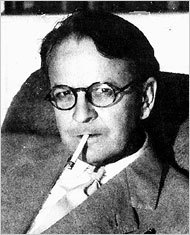 I was more surprised by the cannibalized stories. In many cases Chandler took two short stories and twisted them around each other to build a novel from, so that if you enjoy the books these originals are an interesting read. Are they good? Well, some are markedly NOT as good as what came out of combining them. I quite like the novel The Lady in the Lake but didn’t much care for “No Crime in the Mountains,” which hasn’t aged well at all.
I was more surprised by the cannibalized stories. In many cases Chandler took two short stories and twisted them around each other to build a novel from, so that if you enjoy the books these originals are an interesting read. Are they good? Well, some are markedly NOT as good as what came out of combining them. I quite like the novel The Lady in the Lake but didn’t much care for “No Crime in the Mountains,” which hasn’t aged well at all.
Some of the others were more or less on good footing but not as strong as the books that came after. However, I loved “Try the Girl.” It contains core elements of Farewell, My Lovely, perhaps my favorite of the Marlowe novels, so that might have disposed me to enjoy it. “Try the Girl” goes in a different direction from the novel, yet arrives at just as moving a conclusion. Honestly, it may even be a stronger short story than Farewell, My Lovely is a book. It’s definitely worth seeking out.
A peculiar side effect of reading these tales is that you can thereafter see the seams in Chandler’s novels where he stitched these tales together, just as he might have feared. If you’re a big Marlowe fan you might want to follow Chandler’s directive and avoid them… except for “Try the Girl,” which is, simply, excellent.
Howard Andrew Jones's Blog
- Howard Andrew Jones's profile
- 368 followers



